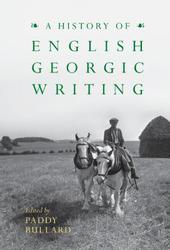
|
A History of English Georgic Writing
Hardback
Main Details
Description
The interconnected themes of land and labour were a common recourse for English literary writers between the sixteenth and twentieth centuries, and in the twenty-first they have become pressing again in the work of nature writers, environmentalists, poets, novelists and dramatists. Written by a team of sixteen subject specialists, this volume surveys the literature of rural working lives and landscapes written in English between 1500 and the present day, offering a range of scholarly perspectives on the georgic tradition, with insights from literary criticism, historical scholarship, classics, post-colonial studies, rural studies and ecocriticism. Providing an overview of the current scholarship in georgic literature and criticism, this collection argues that the work of people and animals in farming communities, and the land as it is understood through that work, has provided writers in English with one of their most complex and enduring themes.
Author Biography
Paddy Bullard is Associate Professor of English Literature and Book History at the University of Reading. He is the author of Edmund Burke and the Art of Rhetoric (Cambridge University Press, 2011), and editor of The Oxford Handbook of Eighteenth-Century Satire (2019). With James McLaverty he co-edited Jonathan Swift and the Eighteenth-Century Book (Cambridge University Press, 2013) and, with Alexis Tadie, Ancients and Moderns in Europe (2016). With Timothy Michael he is co-editor of volume 15 (Later Prose) of The Oxford Edition of the Works of Alexander Pope.
Reviews'This is a generous and wonderfully varied collection which will re-define the idea of georgic for a new readership. There are broadly two meanings of 'georgic': a didactic poem in the style of Virgil's 'Georgics', and emerging from this especially since the Renaissance, an idea about how to write the rural and the agricultural in an artful and serious way. The essays in this book assuredly cover both meanings, enriching our understanding of georgic, and the contributors find in this genre a valuable lens through which to examine and enrich our understanding of a wide range of literature, from ancient to modern.' John Goodridge, Emeritus Professor of English, Nottingham Trent University 'The English georgic, as this superb collection reveals, provides a vital record of the momentous transformation of rural life, land, and labor over the past five centuries. Yet the essays in Georgic Writing also explore topics that resonate across the georgic's long history, including the inseparability of improvement and degradation, the role of art in conveying or concealing difficult truths, and the arduous work of reshaping a dynamic planet to human ends.' Tobias Menely, Professor of English, The University of California, Davis
|